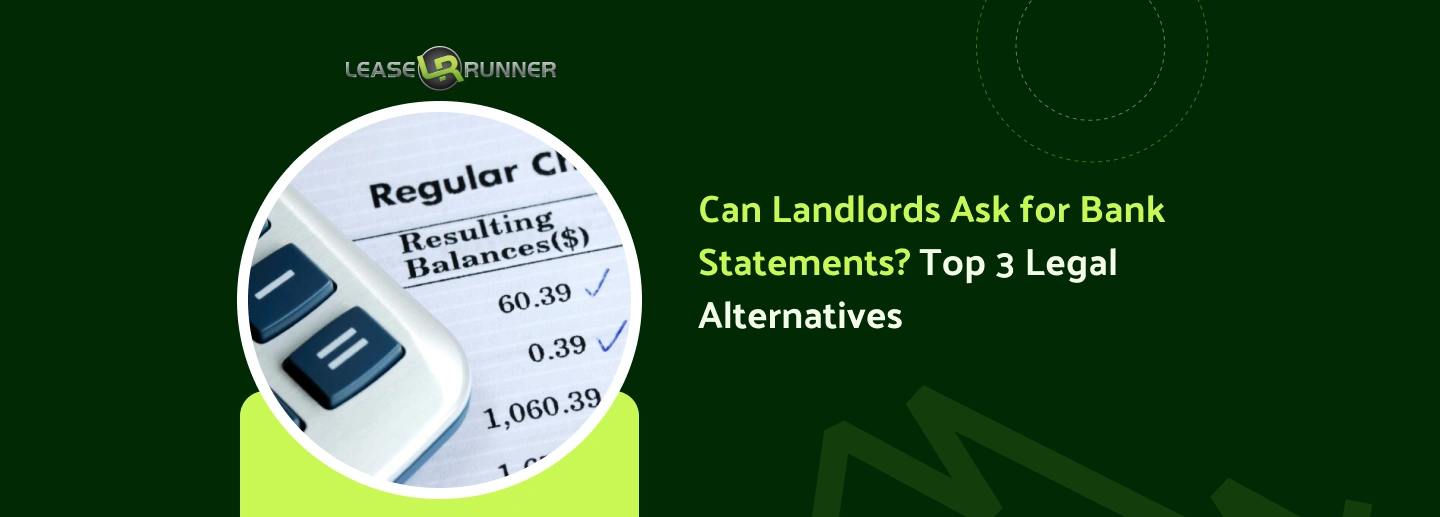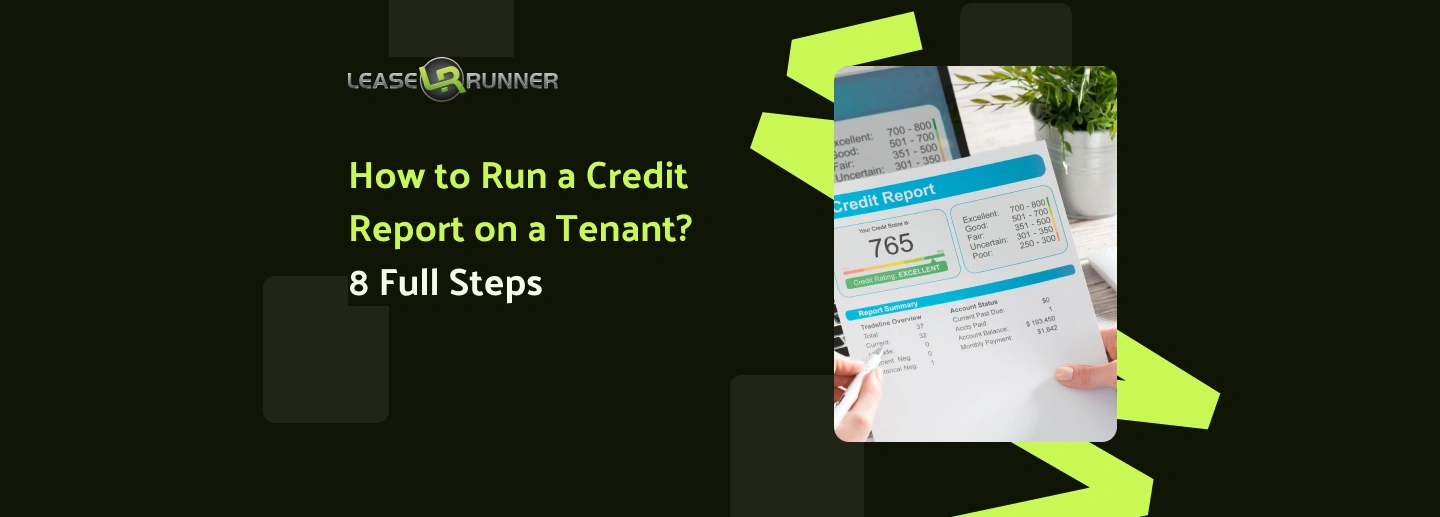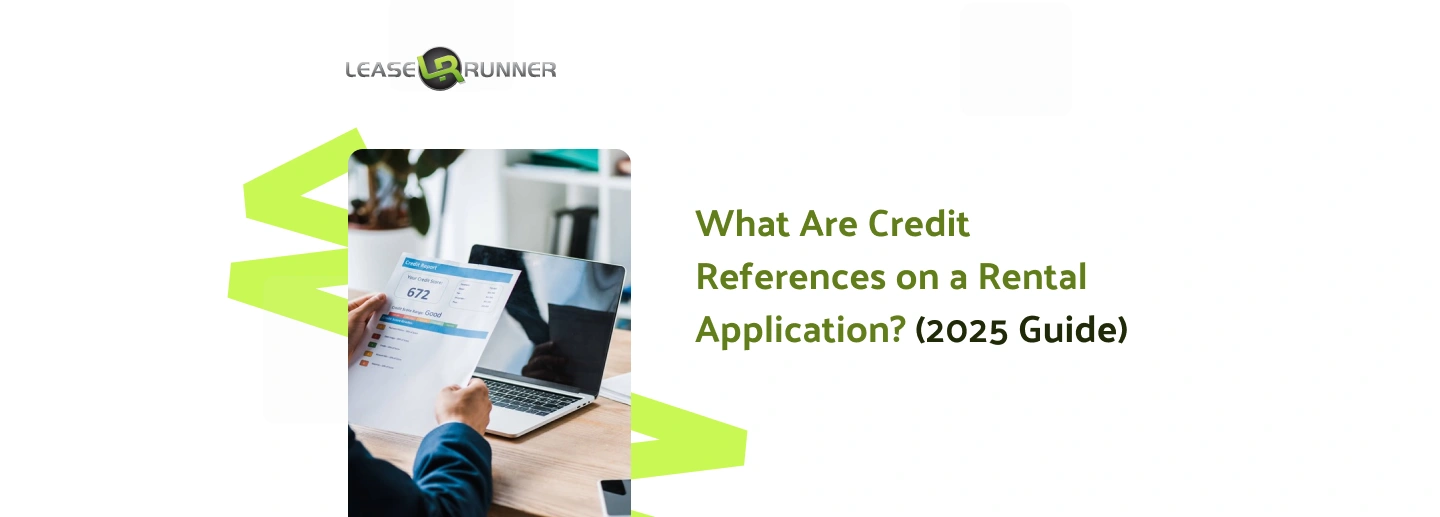When you apply to rent a home, you may wonder, Can landlords ask for bank statements? It happens often. Landlords want to see if you can pay rent on time. Asking for bank statements helps them check your financial stability.
At LeaseRunner, we help landlords screen tenants fairly and safely while protecting your privacy. We also share tips for renters on how to show bank statements without giving away too much personal info.
But is checking tenants' bank statements safe or even legal? In this article, we explain under what circumstances landlords can have the right to ask for bank statements.
We’ll also cover why they want these documents, the risks involved, and smarter ways to check tenant finances. Scroll down for more information now!
Quick Facts Table: Most-Searched Questions About Bank Statement Requests
Can Landlords Ask for Bank Statements?

The short answer is not simply yes. It depends on the regulations of each state or nation whether landlords may ask for a bank statement. Landlords may ask for bank statements in certain countries, provided they complete the right legal processes. To preserve renters' privacy, some others place regulate or ban this.
In certain areas, landlords may ask for a bank statement when you apply to rent to make sure your income is enough to meet the rent. But they can't ask you for your bank account numbers or login details. They also require your consent to look at any financial documents.
On the other hand, other jurisdictions have strong restrictions that say landlords can't ask for bank statements. These regulations are meant to stop discrimination and keep your financial information private.
As part of your application, landlords may also want to see additional papers, such as pay stubs or tax filings. Bank statements are one way among many to verify finances. Understanding this helps you prepare if asked to send your bank details.
Understanding the Legality of Requesting Bank Statements
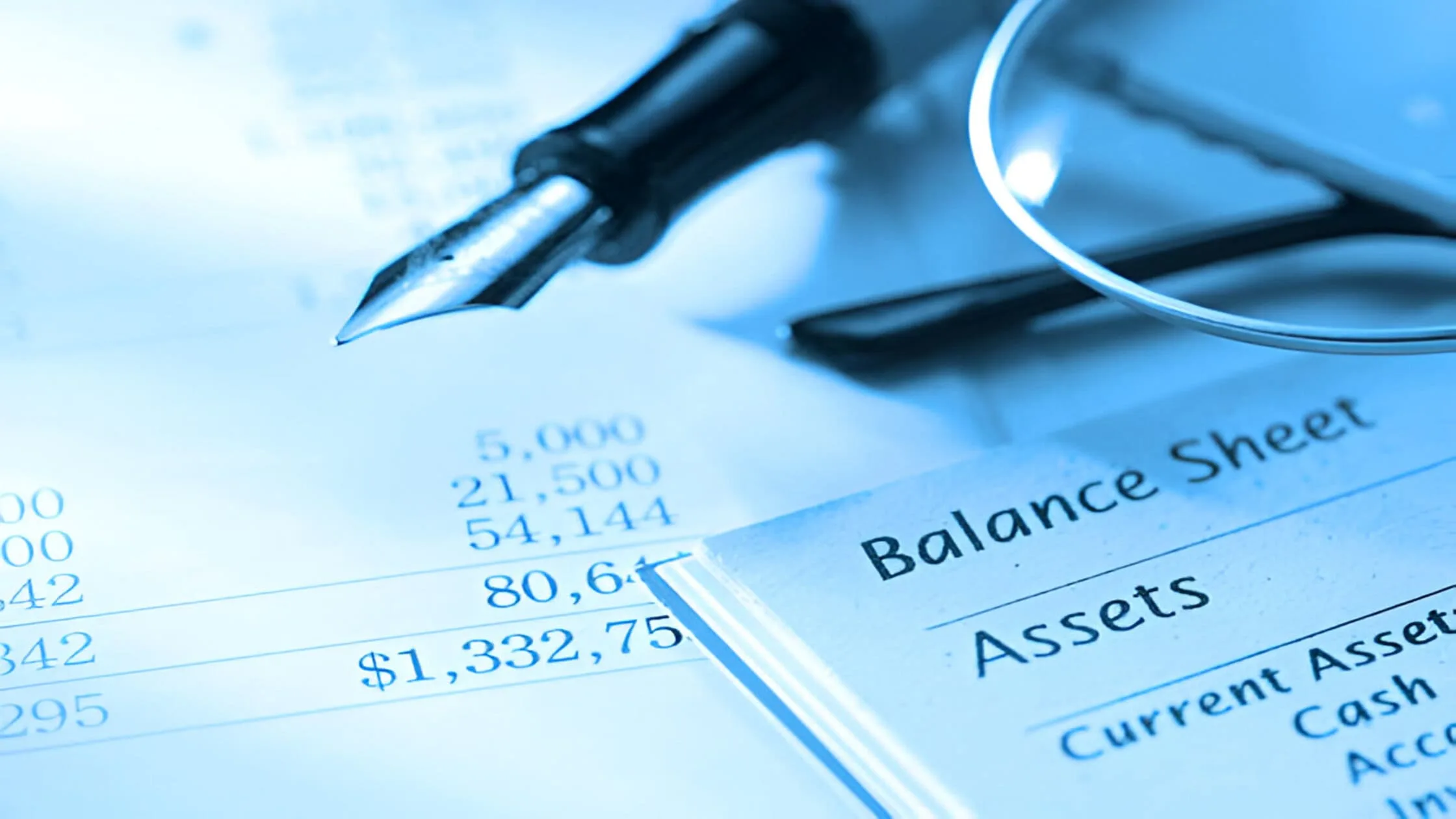
Before discussing these laws, it is important to understand why legality matters. Without clear legal rules, misuse of tenant information can happen, risking privacy and trust.
Clear laws ensure landlords follow fair practices, and tenants have control over what they share. This balance keeps the rental process fair and secure for both sides.
When landlords request a bank statement for a rental application, they are bound by both federal and state laws. These rules balance a landlord’s need to verify tenant finances with a renter’s right to privacy.
Federal Laws Landlords Must Follow
Federal law, including the Fair Credit Reporting Act (FCRA), requires landlords to get explicit written consent before handling financial documents. They cannot log in to your bank account or “pull” your bank statements directly.
For example, if a landlord needs 3 months' bank statements for renting, you must send copies yourself—never your online login. Once received, landlords must store them securely (for instance, in locked filing cabinets or encrypted folders) and only use them for screening.
Afterward, they should properly destroy them, following the FTC Disposal Rule, such as shredding paper or securely erasing digital files.
State-Specific Rules and Requirements
This section focuses on the United States, covering both federal and state-specific rules about landlords requesting bank statements. For example:
- Can landlords ask for bank statements in California? Yes, but California Civil Code 1950.6 limits the request to essential details like proof of income or account balance. They cannot collect unrelated data, such as your restaurant spending.
- Can landlords ask for bank statements in Florida? Yes, but compliance with privacy and fair housing laws is mandatory. For example, a landlord can’t demand bank statements only from a certain ethnic group or family type—this would be illegal discrimination.
If you are outside the United States, be aware that these rules do not automatically apply. Different countries have their own laws regarding tenant financial privacy and landlord requests. Always check local regulations before sharing financial documents.
Situations Where Landlords Cannot Legally Request Bank Statements
Landlords cannot ask for your online banking password, full account history unrelated to rent, or every single transaction. Requests must relate directly to your ability to pay, such as showing steady deposits.
If a request feels intrusive, renters can suggest alternatives like pay stubs, tax returns, or an employment letter instead of sending bank statements to the landlord. Knowing these limits helps you protect your privacy and still meet rental requirements.
When landlords violate these limits, they risk serious legal consequences. Tenants may file complaints for invasion of privacy or breach of tenant protection laws. Landlords can face lawsuits, fines, or penalties imposed by housing authorities or consumer protection agencies.
Why Do Landlords Ask for Bank Statements?
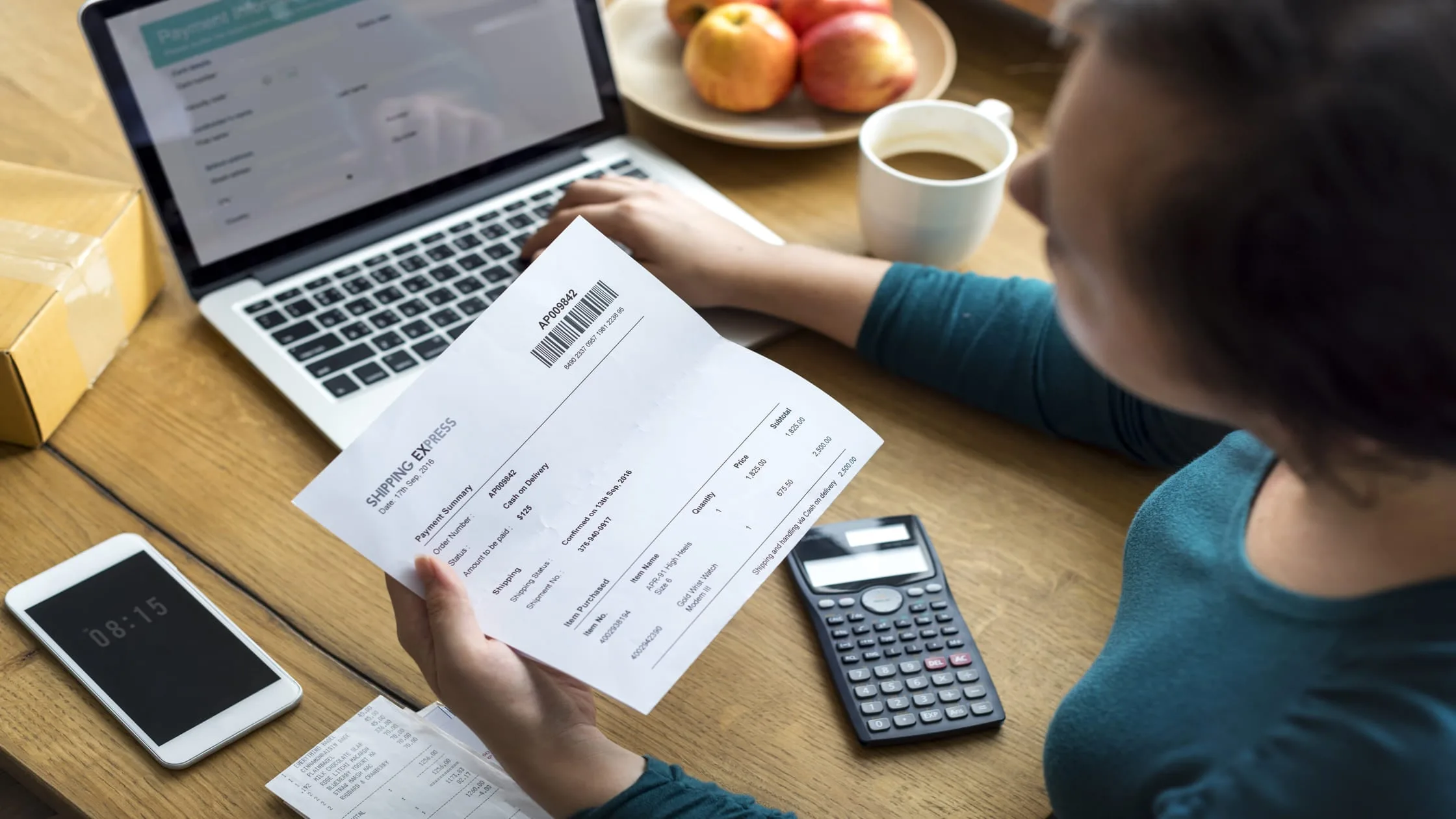
Landlords want to reduce risks when renting out their properties. Asking for bank statements is one way they check an applicant’s financial health before signing a lease. Here’s why landlords commonly request these documents and what they look for.
1. Understanding Financial Stability
A bank statement shows deposits, withdrawals, and savings patterns. This helps landlords judge a tenant’s creditworthiness, a key sign of payment reliability.
Regular deposits suggest stable income, while frequent overdrafts may signal higher risk. Learn more in our guide on what do landlords look for in a credit check.
For example, a landlord who asks for 3 months' bank statements for renting wants to see steady deposits like paychecks rather than irregular or absent income. This helps landlords confirm if you have a consistent cash flow to pay rent on time.
2. Verifying Income and Employment
While pay stubs show your current job and salary, bank statements reveal the actual money arriving in your account. This matters because pay stubs can sometimes be forged or altered. Landlords use bank statements to verify that the income claimed on pay stubs or tax returns genuinely arrives in your account.
For instance, if your bank statement for a rental application shows monthly deposits consistent with your job’s paycheck cycle, it gives landlords confidence that your income is stable and truthful. To learn more about this process, read our guide on how to verify tenant income.
3. Preventing Fraud
Sadly, some tenants provide fake income documents to rent homes they cannot afford. Bank statements are harder to falsify because banks generate them directly. They act as a reliable proof of funds. When reviewing applications, landlords cross-check bank statements against other documents to detect inconsistencies and prevent fraud.
4. Detecting Red Flags
Landlords also look for warning signs in your bank statements. Examples include repeated overdrafts, bounced checks, or erratic deposits that could signal financial trouble. For example, if a landlord notices frequent negative balances across your statements, they may worry about your ability to afford the rent over time.
5. Legal Compliance
Using bank statements for rental application purposes serves an important role. These documents provide proof of steady income and financial stability.
Showing this helps landlords confirm they followed proper screening steps required by law. Proper verification through bank statements protects landlords against future unpaid rent or legal disputes.
6. Tenant Selection
In hot rental markets, landlords receive many applications. Bank statements help them pick tenants with the strongest financial profiles quickly. A tenant who provides clear and steady income evidence via bank statements often stands out among others.
By asking for bank statements, landlords strike a balance between assessing financial risk and choosing reliable tenants. Understanding these reasons helps renters know how to prepare and present their financial information confidently.
Potential Risks and Legal Pitfalls When Asking for Bank Statements
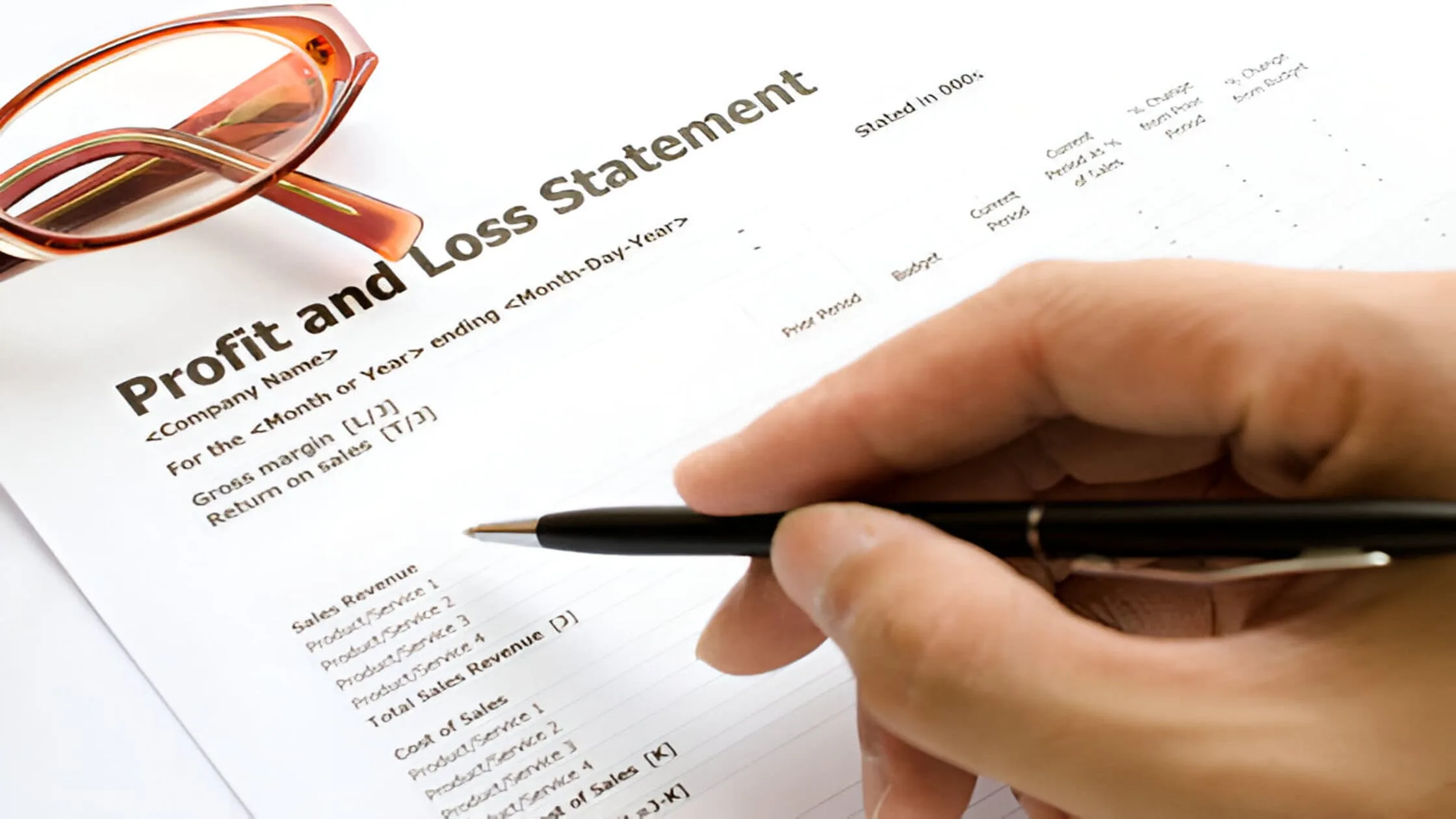
Requesting bank statements as part of a rental application may seem simple, but landlords must confirm whether their local laws allow it, as laws vary.
When landlords do request these, they must follow limits on what information can be asked for. Both landlords and tenants face risks if these rules are ignored. So, understanding legal boundaries helps avoid problems with bank statements for rental application requests.
Privacy and Data Security Concerns
Bank statements contain personal financial details: account numbers, deposit amounts, and even where you shop. If a landlord asks for full bank statements without letting you block out sensitive parts, your info might be exposed.
For instance, sending 3 months' bank statements for renting over an unencrypted email puts data at risk from hackers or accidental leaks.
These statements help verify income stability, track deposits, and assess if tenants can reliably pay rent. Because they reveal detailed transaction history, secure delivery is essential to protect privacy and prevent identity theft while giving landlords accurate information for tenant selection.
Good landlords limit their requests. They ask only for what they need, like proof of income or savings. Maybe they say “show only pages with payroll deposits” or let you redact unrelated transactions. Storing these files safely is a must.
Paper copies should go in locked cabinets. Digital files need strong passwords or encryption. Many use secure upload links—think of LeaseRunner’s digital document system for sending bank statements to the landlord.
At the end of the process, landlords need to follow the FTC Disposal Rule means shredding paper documents and erasing all digital copies.
Discrimination and Fair Housing Violations
A landlord shouldn’t ask only certain tenants for bank statements. For example, if someone requests more details from applicants of a specific race, family size, or background, that’s illegal under fair housing law.
If a landlord in California asks for extra bank statements only from single parents, it’s discrimination. Always use the same rules with every renter. Ask for the same documents—pay stubs, bank statement for rental application, or tax returns—from all who apply.
Liability for Mishandling Sensitive Financial Data
If a landlord loses your bank statements or someone unrelated sees them, the landlord can get sued. This happens if documents are left out, shared without consent, or emailed on an unsecured network.
A landlord should lock up paper files, password-protect digital ones, and allow access only to those who actually screen tenants. If a data leak happens, the landlord may have to pay fines or damages.
By being careful when requesting and handling bank statements for a rental application, landlords protect themselves from legal trouble—and keep their sensitive information safe.
Evaluate tenant reliability with compliant screening methods — no unnecessary paperwork or privacy issues.

Verify Tenant Finances Without Crossing the Line
Best Practices for Requesting Bank Statements For Landlords
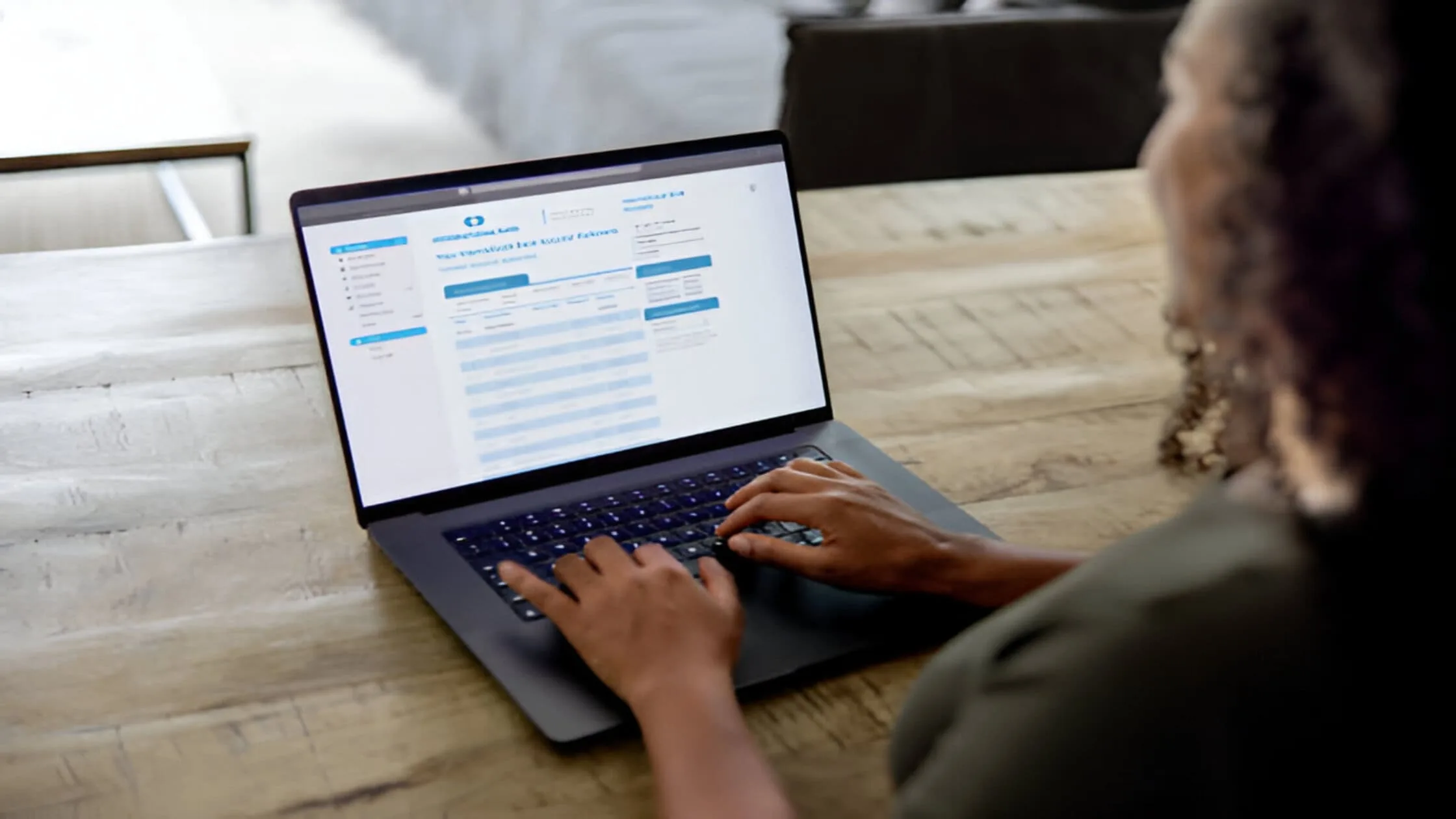
Requesting bank statements for a rental application is common in tenant screening, but it must be done carefully. A clear process protects tenant privacy, avoids discrimination, and keeps you within the law.
Apply Screening Criteria Consistently
Set one rule for everyone. If you need 3 months' bank statements for renting, ask every applicant for the same. Don’t request full bank statements from one tenant, but only pay stubs from another. Say you have five applicants for the same unit—give each the same document checklist. This keeps your process consistent and reduces fair housing risks.
Limit the Scope of the Request
Only ask for the parts you need. Many landlords accept just the pages showing income deposits or proof of savings. Tenants can cover account numbers or unrelated spending.
For example, when you review a bank statement for a rental application, you might check for salary payments listed once or twice a month, while ignoring grocery or personal purchases. That way, you assess the ability to pay rent without invading full financial privacy.
Use Secure Submission Methods
Avoid collecting sensitive files through regular email. Use encrypted portals or trusted upload tools—like LeaseRunner’s platform for sending bank statements to the landlord. These services lock the document behind password protection and encryption, both in transit and in storage.
Proper Storage and Disposal of Documents (FTC Disposal Rule)
Keep bank statements secure while you need them. Lock printed files in cabinets. Protect digital copies with encryption and strong passwords. When finished, follow the FTC Disposal Rule: shred paper and permanently delete electronic copies. This prevents identity theft and protects both you and the tenant.
Using consistent rules, limited requests, secure transfer, and proper disposal shows professionalism and respect—which keeps bank statements for rental application handling compliant and safe.
Top 3 Legal Alternatives to Bank Statements When Evaluating Tenant Finances

Landlords don’t always have to request bank statements for a rental application to check finances. There are legal, safer alternatives that protect privacy while still showing proof of income. Here are three effective options.
1. Pay Stubs
Pay stubs confirm current earnings without revealing private bank information. For example, if the rent is $1,500 per month, two recent pay stubs showing $4,000 in monthly gross pay are a strong indicator that the applicant can afford the unit.
Unlike a bank statement, they don’t expose other transactions, balances, or spending habits. They’re quick to verify and widely accepted in place of 3 months' bank statements for renting.
2. Tax Returns or W‑2/1099 Forms
Tax returns and forms like W‑2s or 1099s give an official record of annual income. These are helpful for self‑employed tenants or anyone with inconsistent pay.
For instance, if a freelance designer has different income amounts each month, last year’s tax return can confirm total earnings and overall stability. This method meets your need for proof, and it offers credibility since the data is filed with the IRS.
3. Employment Verification Letter
An employment verification letter comes directly from the tenant’s employer and confirms job title, start date, and salary. This is particularly useful for applicants who are newly hired and do not yet have multiple pay stubs.
For example, a letter stating “Full‑time position at $50,000/year” assures you that the tenant has stable income while keeping their personal banking activity private.
By using these alternatives, you can verify tenant income accurately while reducing privacy risks—and still achieve the same level of assurance as you would from reviewing a bank statement for a rental application.
How to Evaluate Tenant Finances Without Bank Statements?

As a landlord, you do not have to rely only on bank statements for a rental application to judge if a tenant is a good fit. Many landlords use other ways to check if tenants can pay on time.
Review Rental History and References
Ask about the tenant’s past. Did they pay rent late? Were they respectful? Call their old landlord or property manager. Listen for stories of late payments, unpaid rent, or property issues.
For example, if a reference says, “They always paid before the first,” that can matter more than seeing a bank statement. Positive reviews mean the tenant is trustworthy, even without seeing their 3 months' bank statements for renting.
Consider Co-Signers or Guarantors
If an applicant’s income history is short or inconsistent, request a co‑signer. A co‑signer acts as a financial backup—if the tenant cannot pay, the co‑signer covers the rent. For instance, many student applicants have parents as co‑signers.
This gives you another layer of security. You may not need a bank statement for a rental application since you have a guarantee of payment from a responsible third party.
Use Credit Reports and Scores
With the tenant’s agreement, pull their credit report. This shows bill-paying habits and any debts. Did they pay their credit cards on time? Are there late fees or unpaid loans? LeaseRunner’s credit check tool makes this easy and safe.
For more insight into evaluating credit, refer to our article on what are credit references on a rental application. This method allows you to assess financial risk without having to ask for bank statements. You see a pattern—are they responsible, or do they often miss payments?
Landlords can trust these three tools. Rental references, co-signers, and credit scores give a broad view of tenant reliability. You protect privacy while still reducing your risk. This way, bank statements for a rental application become just one option, not a must-have.
Conclusion
Can landlords ask for bank statements? Yes, landlords can ask for bank statements to check tenant finances and rental eligibility. But such requests must follow laws that protect privacy. At LeaseRunner, we encourage landlords to use alternatives like pay stubs and employment verification letters when possible.
If bank statements are requested, tenants should share them safely by redacting sensitive info and using secure submission methods. This balanced approach helps landlords make smart decisions while respecting tenant privacy. Knowing your rights and how to show bank statements confidently will make your rental process smoother.
FAQs
Is it safe to give a bank statement to a landlord?
It’s safe if you block out sensitive details like account numbers and send your statement securely. Confirm the landlord or manager is legitimate before sharing any info.
Can I refuse to provide a bank statement?
You can refuse, but it may hurt your chances. Offering pay stubs or tax returns is a good alternative.
How to show a bank statement for an apartment without revealing sensitive info?
Redact or black out personal details not related to income. Share only the parts showing deposits and regular income.
Is it normal to be asked for bank statements?
Yes. In high-demand markets or for costly rentals, landlords often request bank statements to confirm a tenant’s financial stability.
